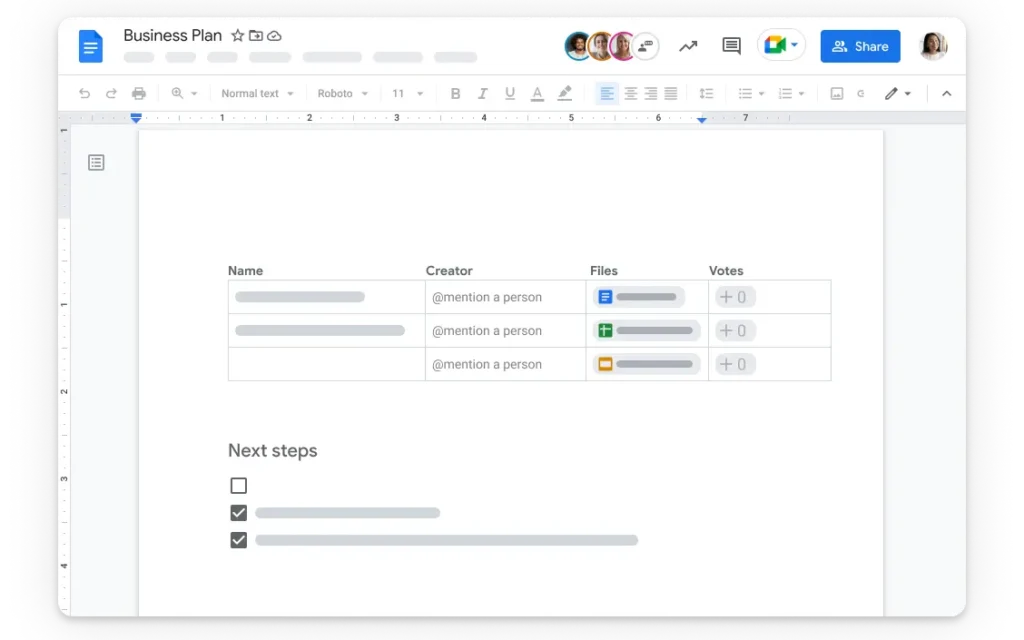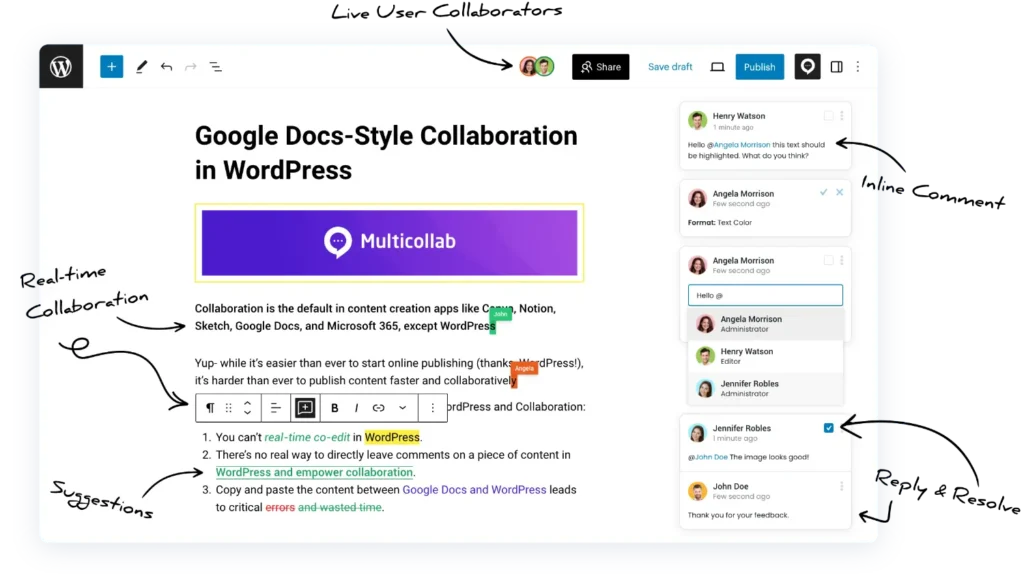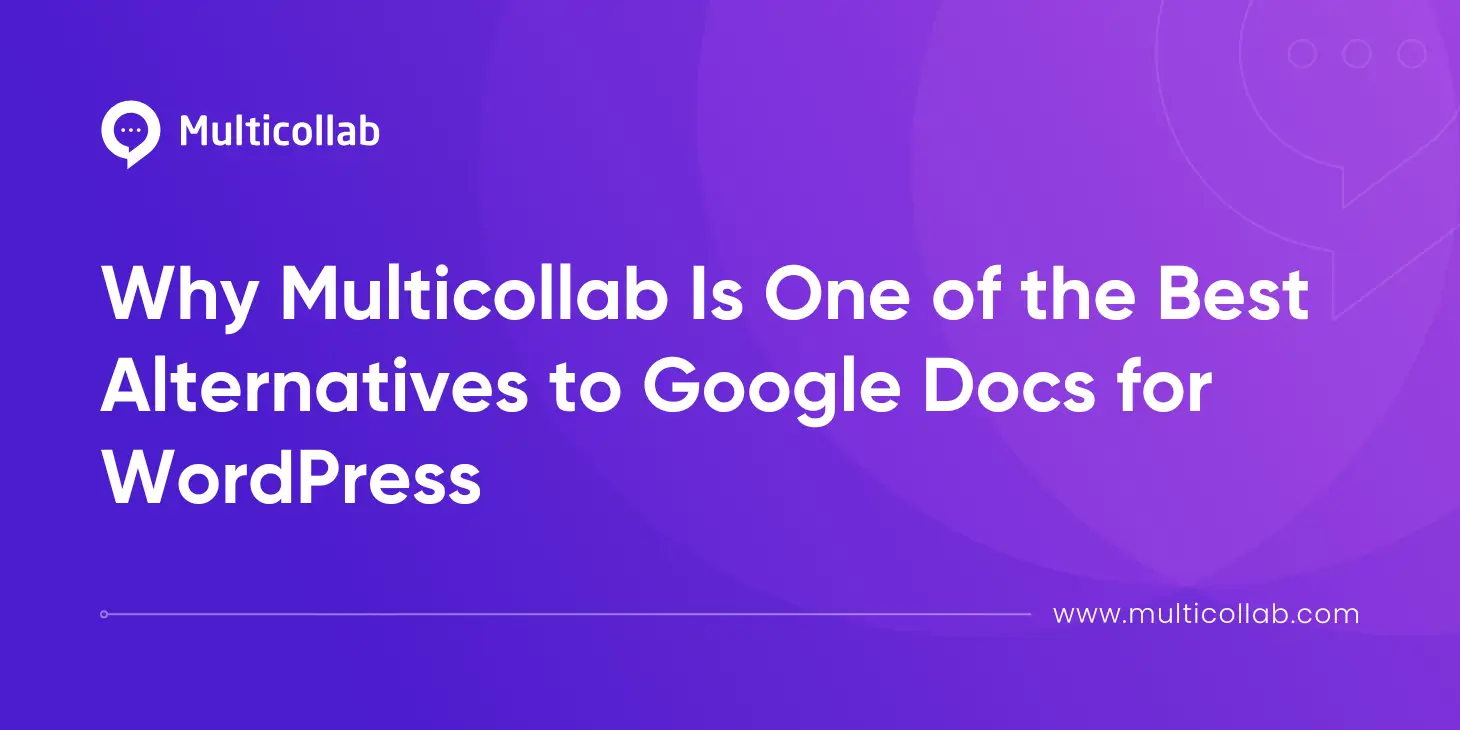Table of Contents
Many WordPress teams rely on Google Docs to draft and collaborate but it wasn’t built for publishing in WordPress. Formatting breaks, SEO elements get lost, and the workflow slows down. Multicollab, as one of the best Google Docs alternatives, fixes that.
It brings Google Docs-style collaboration features like comments, suggestions, and real-time editing right into the WordPress editor.
In this post, we’ll show you why Multicollab is the best alternatives to Google Docs for writers, publishers, and content teams working in WordPress.
Why people love Google Docs for collaboration
Before we get into the limitations, it’s worth acknowledging why Google Docs became a go-to tool for so many teams.
Google Docs is simple, cloud-based, and easy to share. That’s why many teams still rely on it as their main writing and collaboration platform. It offers:
Real-time editing – More than one person can work on the same document at once.
Inline comments – Editors can leave suggestions right in the text, and writers can respond or resolve them instantly.
Easy sharing – A few clicks and anyone can view, comment on, or edit a file.
Access anywhere – Since it’s cloud-based, your files follow you across devices.

For general writing and feedback, Google Docs checks all the boxes. But once the content needs to live in WordPress, those strengths start to turn into workflow issues.
Where Google Docs falls short for WordPress users
Google Docs is great for writing, but not so great when your final destination is WordPress. If you’ve ever copied content from Docs into the WordPress editor, you already know the pain.
Here’s where things start to break down:
Copy-paste formatting issues: Headings, bullet points, links, and spacing often get lost or distorted when you move content from Google Docs into the block editor. What should be a quick transfer ends up taking time to clean up.
Lost media and custom elements: Google Docs doesn’t support embedded media, shortcodes, or custom blocks—things that are standard in WordPress. So you have to re-insert everything manually.
Workflow fragmentation: Your team writes in Docs, discusses edits in Slack or email, and publishes in WordPress. That’s three platforms for one job. More tools mean more steps and more chances for things to slip through the cracks.
Version control headaches: It’s easy to lose track of the “final version” when it lives outside the platform where it will be published. Someone’s editing in Docs, someone else is tweaking in WordPress, and no one’s quite sure which version is current.
Slower publishing cycles: When you add up the reformatting, content migration, and tool switching, it slows everything down. Feedback loops get longer. Deadlines get tighter. And what should be a simple post turns into a drawn-out process.
Google Docs is great at what it does. But when your team works in WordPress, you need a tool built for that environment. That’s exactly what Multicollab was made for.
Meet Multicollab – a true WordPress alternative to Google Docs

Multicollab is a collaboration plugin built specifically for WordPress content teams. It brings the best parts of Google Docs: real-time editing, inline comments, and suggestions, all into the WordPress block editor.
Here’s what you can do with Multicollab:
Comment directly on content blocks – Leave feedback on text, images, or even custom blocks—just like you would in Google Docs.
Suggest edits instead of making them – Use suggestion mode to propose changes that the author can accept or reject.
Tag team members with @mentions – Keep discussions organized and make sure the right people are looped in.
Collaborate in real time – Work on the same post or page with other team members at the same time.
Track every change – See who made what change, when, and why, with full version history.
Receive notifications – Stay updated via email or Slack whenever there’s a new comment, edit, or mention.
And the best part? It all happens inside WordPress. No more switching tabs, tools, or formats. Your team can draft, review, and publish—all in one place.
Whether you’re a solo writer, a multi-author blog, or a large editorial team, Multicollab gives you the kind of editorial workflow you’ve always wanted.
Google Docs vs. Multicollab: An in-depth comparison
At first glance, Google Docs and Multicollab offer some of the same collaboration features. But when you look closer, especially from a WordPress publishing perspective, the differences become clear.
| Features | Google Docs | Multicollab |
| Real-time editing | ✅ Yes | ✅ Yes (inside WordPress) |
| Inline comments | ✅ Yes | ✅ Yes |
| Suggestion mode | ✅ Yes | ✅ Yes |
| @mentions | ✅ Yes | ✅ Yes |
| Works inside WordPress | ❌ No | ✅ Fully integrated |
| Preserves formatting | ❌ No | ✅ No reformatting needed |
| Embeds and shortcodes | ❌ No | ✅ WordPress-native support |
| Media compatibility | ⚠️ Limited | ✅ Full media and block support |
| Role-based collaboration | ⚠️ Basic sharing | ✅ Granular WordPress permissions |
| Notifications (email or Slack) | ❌ No | ✅ Built-in |
| Version history | ✅ Yes | ✅ Yes |
What this means for your team
Google Docs is great for drafting and early-stage feedback. But once the content moves toward publishing, the workflow becomes slower and harder to manage.
Multicollab, on the other hand, is built for WordPress. Your team can comment, suggest changes, approve content, and hit publish—all without switching platforms or reformatting content.
If your workflow is tied to WordPress, staying in WordPress makes a big difference.
Editorial workflow – Google Docs vs. Multicollab
When you’re managing content as a team, the workflow matters just as much as the writing. The fewer the steps, the smoother the process.
Let’s break down what a typical editorial workflow looks like when using Google Docs compared to Multicollab.
How it works with Google Docs
- Writer creates a draft in Google Docs
- The doc is shared with editors for comments and suggestions
- The writer revises based on feedback
- Someone copies the final version into WordPress
- Formatting is cleaned up manually (headings, links, images, etc.)
- SEO fields, categories, and featured image are added
- The content is reviewed again in WordPress
- Final edits are made
- The post is scheduled or published
Tools involved: Google Docs, WordPress, Slack or email (for communication)
Challenges:
- Formatting often breaks when content is moved into WordPress
- Media and embeds need to be reinserted
- Feedback happens in one tool, but publishing happens in another
- Team members lose time switching between platforms
How it works with Multicollab
- Writer drafts content directly in WordPress
- Editors leave inline comments and suggestions using Multicollab
- The writer makes changes in real time
- SEO fields, images, and formatting are already in place
- The final review and approval happen in the same post
- The post is published
Tools involved: Just WordPress
Benefits:
- No copy-paste or reformatting
- Fewer steps and fewer tools
- Feedback, revisions, and publishing all happen in one place
- Teams move faster and stay focused
What this means for your team
With Google Docs, you spend time moving between tools. With Multicollab, you move the content forward. It’s the difference between maintaining a workflow and actually streamlining it.
If your goal is to simplify how your team collaborates and publishes, this one change—working inside WordPress—can save hours every week.
How different teams use Multicollab
Whether you’re a solo writer or part of a large editorial team, Multicollab adapts to the way you work. It’s built for teams that need to create, review, and publish content directly in WordPress—without adding extra tools or steps.
Here’s how different teams are using Multicollab to get more done with less friction:
Multicollab for writers: Writers can draft content inside the WordPress block editor and get feedback without ever leaving the post. There’s no need to wait for an editor to email back a file or check a Google Doc. Comments appear right in the post, and suggestions can be reviewed and applied instantly.
- Faster turnaround from draft to publish
- Less back and forth
- Fewer formatting issues
Multicollab for editors: Editors get full control over reviewing content within WordPress. They can leave inline comments, suggest changes, and tag team members to resolve questions—just like in Google Docs, but without the need to switch tools.
- Centralized editing and collaborative feedback management
- Clear version history
- Easier to track progress on multiple posts
Multicollab for agencies: Agencies managing multiple websites or client projects can streamline their internal workflows. Editors, writers, and project managers can collaborate on posts in real time, speeding up approval cycles and reducing time-to-publish.
- Faster project delivery
- Easy collaboration across roles
- No dependency on external tools
Multicollab for publishers and enterprise teams: Larger teams with structured workflows benefit from Multicollab’s role-based permissions, version control, and integrations with email or Slack. You can assign responsibilities, manage approvals, and keep editorial workflows moving at scale.
- Scalable collaboration
- Secure content review and publishing
- Compliance with internal processes
Multicollab establishes itself as an efficient workflow solution for any team that publishes in WordPress.
Benefits of using Multicollab over Google Docs
When your team works in WordPress, adding Google Docs to the process doesn’t always help, it adds friction. Multicollab removes that friction by keeping everything in one place.
Here are the key benefits of switching to a native, WordPress-first collaboration tool like Multicollab:
- No more switching between Google Docs, Slack, and WordPress. Your team can write, review, and publish without leaving the WordPress dashboard.
- Copying content from Docs often breaks headings, spacing, and media. With Multicollab, you write and edit inside WordPress, so formatting stays exactly how it should.
- By cutting out unnecessary steps and platforms, your content moves faster from draft to published. Fewer tools means fewer delays.
- Everyone works on the same version. You can track edits, review changes, and see exactly who did what—no back-and-forth over email needed.
- Comments, suggestions, and mentions happen inside the content you’re actually publishing. There’s no need to explain where something is or copy feedback from one tool into another.
- Multicollab doesn’t try to be a writing app that also works with WordPress. It’s built specifically for content teams who live in WordPress every day.
The result? Fewer handoffs. Fewer formatting problems. And a much more efficient way to collaborate on content, without ever leaving your CMS.
Is there a free version of Multicollab?
Multicollab offers a free version that includes all the core features most WordPress content teams need to collaborate effectively. You can add comments, make suggestions, tag team members, and edit content in real time—all without leaving the WordPress editor.
Here’s what you get with the free version:
- Inline commenting
- Suggestion mode
- Real-time collaboration
- Basic @mentions
- Compatibility with posts and pages
It’s a great option if you’re just getting started or want to try out the workflow without any cost.
What’s in Multicollab Pro and Enterprise plans?
For teams that need more control, speed, and customization, the premium plans unlock:
- Collaboration on custom post types (like products or landing pages)
- Role-based access and permissions
- Slack and email notifications
- Detailed activity history
- Support for large teams and enterprise workflows
Whether you’re a freelancer, an agency, or a publisher managing multiple writers, there’s a plan that fits the way you work.
You can compare all plans on Multicollab’s pricing page.
Final thoughts – Why Multicollab is one of the best alternatives to Google Docs for WordPress
Google Docs is a solid tool for writing and early-stage collaboration. But once your team starts preparing content for WordPress, the cracks start to show.
Multicollab fills that gap by bringing collaboration features directly into the WordPress editor. It gives you the power to write, review, and publish—all in one place, without the usual back-and-forth or formatting issues.
You can start with the free version of Multicollab and see the difference in your workflow right away.







